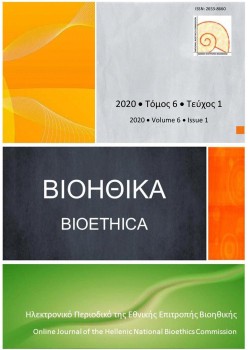Bioethics of Bioastronautics

Abstract
The rise of emergent space initiatives -especially of private ones- has begun to push the boundaries of the space industry, thanks to technological innovations that will soon be able to significantly facilitate the development of previously neglected pioneering fields, such as, for example, space research and exploration, space resources utilization, and human access to space. The invigoration and the forthcoming growth of this new space economy in the aforementioned pioneering fields are expected to bring forward important bioethical issues. The purpose of this paper is to summarize the most important of these issues, after a review of a significant number of relevant publications in the international academic literature. In particular, this paper will present bioethical issues in the field of bioastronautics -especially in light of future missions to Mars- that refer to both life on Earth, i.e. microorganisms, plants, animals and humans, and to potential extraterrestrial life. Given the accelerating rate of developments, the best time to discuss these issues, in order to inform policymaking, is now.
Article Details
- How to Cite
-
Profitiliotis (Γεώργιος Προφητηλιώτης) G. (2020). Bioethics of Bioastronautics. Bioethica, 6(1), 20. https://doi.org/10.12681/bioeth.22616
- Section
- Original Articles

This work is licensed under a Creative Commons Attribution 4.0 International License.
Authors who publish with this journal agree to the following terms:
- Authors retain copyright and grant the journal right of first publication with the work simultaneously licensed under a Creative Commons Attribution CC BY 4.0 License, which allows for immediate free access to the work and permits any user to read, download, copy, distribute, print, search, or link to the full texts of articles, crawl them for indexing, pass them as data to software, or use them for any other lawful purpose. Appropriate credit must be given by citing the author(s) and the original publication in this journal.
- Authors are able to enter into separate, additional contractual arrangements for the non-exclusive distribution of the journal's published version of the work (e.g. post it to an institutional repository or publish it in a book), with an acknowledgement of its initial publication in this journal.
We encourage authors to deposit their articles, as well as data underlying the publications, in institutional and/or other appropriate subject repositories.
Bioethica permits and encourages authors to archive the final publication pdf in institutional (e.g. the repository of the National Hellenic Research Foundation) or other appropriate subject repositories (e.g. SSOAR repository for social sciences), in compliance with institutional and/or funder open access policies, after publication in the BIOETHICA. Authors must provide bibliographic details that credit publication in the journal, as well as related funding details (when applicable).
Lists of institutional and other subject-based academic open access repositories can be found listed by country at the registry http://opendoar.org/countrylist.php
If your institution does not possess a repository you may deposit a copy of your paper at no cost with www.zenodo.org , the repository supported for open access research in the EU by the European Commission, through the project OpenAIRE (www.openaire.eu )


